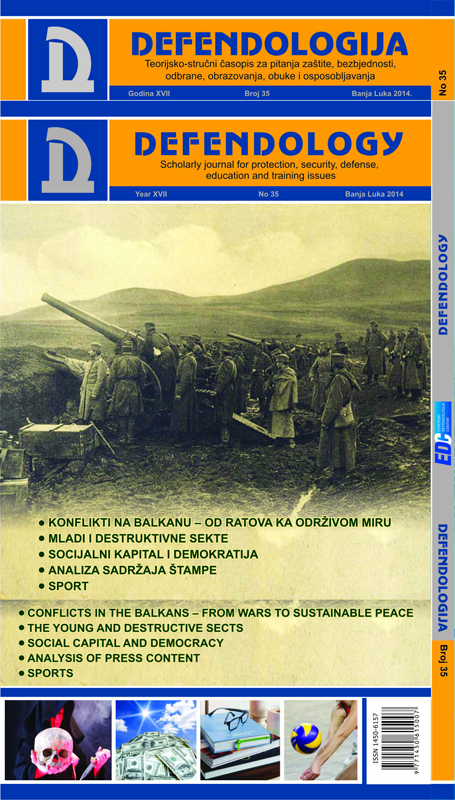DEMILITARIZATION OF BOSNIA AND HERZEGOVINA IDEA, UTOPIA OR SOMETHING ELSE
DOI:
https://doi.org/10.7251/DEFEN1401005NAbstract
The history of human society can be, unfortunately, best perceived through the
history of warfare. At any given moment in the world there was a war waged, and many of them have been fought after they were banned, post World War II. The mere prohibition of the wars of aggression by the UN did not stop them from breaking out. Wars are closely related to the realization and protection of the interests of belligerents. It is not always necessary to initiate war to realize these interests. The main forces in war are military forces and the appearance of militarism is not unusual. It is closely linked with a specifi c time and space. Strengthening the power of military circles is accompanied by strengthening the resistance to this, by all means, negative phenomenon, most often in the form of antimilitarism. The war in BiH can be viewed, in many respects, in broader, theoretical aspects. Its main characteristics could not have been the instigating factor for the idea of demilitarization in BiH. The seriousness of circles and circumstances it is debated in points to its political signifi cance. This requires a broad and quality consideration during the process of formation of critical attitudes. After war comes peace, which is far more complex than war and which requires a lot of effort. In war “the main” idea is to defeat the enemy, whereas in peace the following springs up:
• end the war,
• build up peaceful and prosperous social community and
• prevent new confl icts from breaking out, a new war.
The BiH citizens still suffer the consequences of the past war, and for some it still
has not fi nished, it has only changed in form. Instead of development, many processes are directed in the wrong way. Confl icts are still present, and the current state of peace cannot guarantee its stability. The reforms which were implemented and are still being implemented have the centralization of BiH as their priority, and not the improvement of the current situation. This kind of situation does not contribute to building peace and prosperity. There is still hope that the outcome will be positive. The National Assembly of the Republic of Srpska (NARS) has adopted the Declaration on demilitarization (Declaration on strategic commitments of the RS in the defense system). Political entities of the RS, in the fi eld of defense, are advocating demilitarization policy. Those in disagreement with this policy are silent or they do not have a signifi cant role on the political scene. Demilitarization policy is not correctly shaped and it can be disputed because of:
• basis for attitudes,
• real goals,
• superfi ciality,
• collision of points of view.
Thus its effects are diminished.
